- What John Lennon Thinks of Donald Trump - November 14, 2016
- The Meaning of Fun: The Paul is Dead Rumor - February 3, 2016
- BEATLES-STREEP-SHEA SHOCKER: IT’S NOT HER!!!! - August 13, 2015
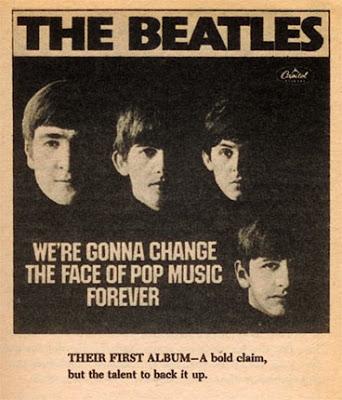 DEVIN McKINNEY • Note from the future (2013): Refreshing this post four years after assembling it, I find that a couple of the hyperlinks are no longer functional—one doesn’t exist, while the other exists but doesn’t yield the indicated information. But this is the story of a few hours’ Internet idling, a mesh of the long-gone afternoon, and rather than rewrite it to excise the dud links, I let it stand. The links once worked, and they said what I said they said. Honest.
DEVIN McKINNEY • Note from the future (2013): Refreshing this post four years after assembling it, I find that a couple of the hyperlinks are no longer functional—one doesn’t exist, while the other exists but doesn’t yield the indicated information. But this is the story of a few hours’ Internet idling, a mesh of the long-gone afternoon, and rather than rewrite it to excise the dud links, I let it stand. The links once worked, and they said what I said they said. Honest.
As I commented on “The Best Dancer” below, thinking about Chuck Klosterman’s piece got me thinking about Mark Shipper’s piece—which, being a book, is a much bigger piece. Its title tells you that: Paperback Writer—The Life and Times of the Beatles, the Spurious Chronicle of Their Rise to Stardom, Their Triumphs and Disasters, Plus the Amazing Story of Their Ultimate Reunion. That blows the hell out of Klosterman’s title, which is a mere five words long.
The book behind the title likewise goes much further down the same path toward a reinvention of not just the Beatles’ factual history, but also the general perception and popular mythology around them. “The finest novel ever written about rock and roll,” goes the Greil Marcus blurb on the back; “Marvelously entertaining!” says Hilburn of the LA Times; “Devastatingly funny” writes Selvin in the SF Chronicle.
I love the book my own self, and began wondering what became of Shipper. Apparently others have wondered that too. My Internet caught this email exchange (whence I swiped the images posted here) between Scott Woods, majordomo at Rockcritics.com, and Richard Riegel, who reviewed Paperback Writer for Creem upon its 1978 release. Woods and Riegel discuss the novel (Scott reckons it funnier than The Rutles) and the mystery attaching to its now-you-see-him-now-you-don’t-author, who followed up the Beatles satire with the compellingly titled How to Be Ecstatically Happy 24 Hours a Day for the Rest of Your Life, and then went underground, or at least sufficiently near to the fringes that he may be theorized as the J. D. Salinger of rock writers.
Riegel mentions that our elusive satirist now does something called “The Shipper Report,” which would make him the “rarely-seen radio guru” referenced here, as well as the subject of this vintage piece of journalistic documentary from the Bush I era. Though Shipper is also said to have written for Creem in its early days, Woods says that in scanning back issues he has never come across his name. However, at the same time, Shipper demonstrably was in charge of a fanzine called Flash, which I discover is quite highly regarded in the annals of that particular subculture. Fanziner Christopher Stigliano constructs what must stand as the definitive history-critique of the short-lived Flash, including reprinting Shipper’s Bangs- and Meltzer-influenced mission statement. Down below, if you scroll, is an extensive thank-you response from Shipper himself, which would seem to confirm his continued existence as of February 16, 2007. And another blog entry (sadly now unavailable–MG), with a much fuller low-down on the content of Paperback Writer than I’ve offered here, includes another, much shorter response from Shipper, which brings us up to September 18, 2008.
Time since then, as far as I can find it, goes unrecorded in the public forum. But I hope Mark is working his wang dang doodle somewhere this very moment, well and happy.
One more piece of Shipperiana, or related bizarrerie: A centerpiece of Paperback Writer is a deliriously imagined songwriting summit between a fully-baked Lennon, McCartney, and Dylan, the three magi drawing from their collective marijuana mists a horror of Surrealist wordslop called “Pneumonia Ceilings.” (“You’ve got the idea,” Bob encourages Paul, “but the problem with your line is that it could make sense.”) I recalled that I had not so very long ago come across a reference to this “song,” but a reference that assumed it was real! Couldn’t recall where, though, till some peremptory ‘netting led me here, where the story is likewise repeated for fact.
Ta, Rock Turtleneck: Your scroll-down commentator rights the historical wrong, and you remind me that where I saw Mark Shipper’s “Pneumonia Ceilings” gag first become academic-archival myth was in the gazillion-page reference work The Bob Dylan Encyclopedia, by Bob scholar Michael Gray—which our very own Beatle Ed had me review in the Village Voice three years ago!

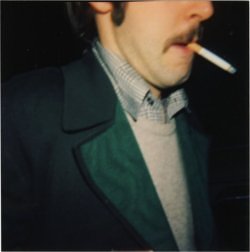
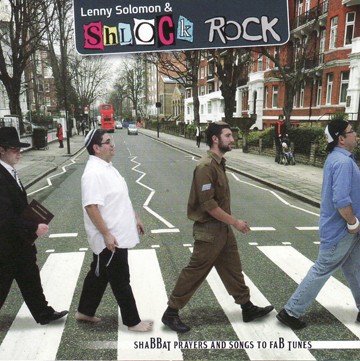


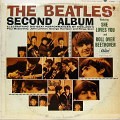



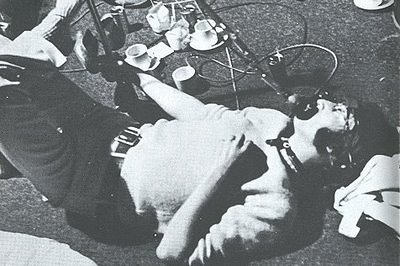
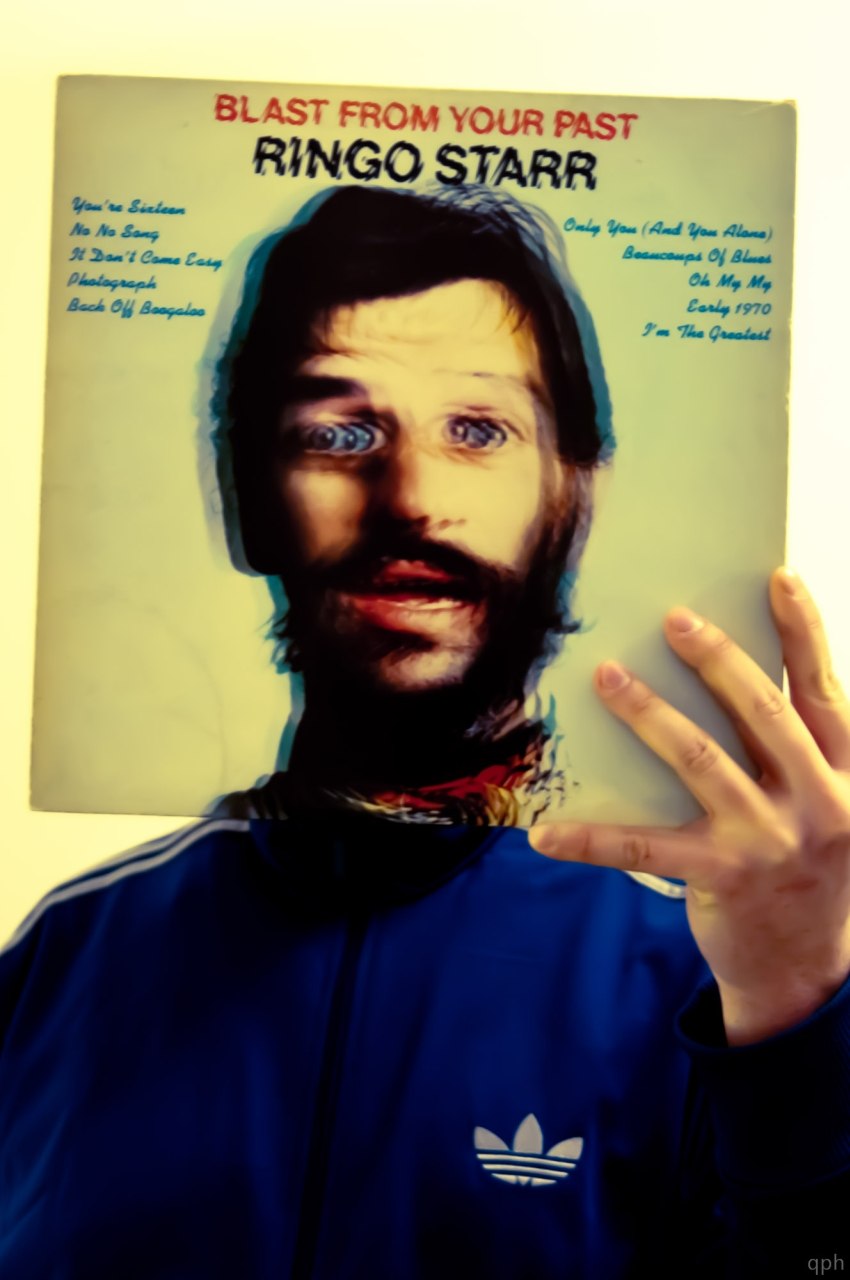
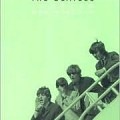

Oh man, this guy is MY PEOPLE. A ‘zine, then a Beatles comedy, then writing gags for radio? Practically lived my life 20 years before I have. I took a run at a “Paperback”-type idea last year, but the souffle never really rose, and I’m glad it didn’t, because Shipper’s book sounds great.
He was down in Marina del Rey (the next town over from where I am); I’ll see if I can track him down. If so, I’ll do an interview for the site. Thanks, Dev, for the spadework.
Yes! You and he are a natural hookup. And don’t give up on your personal souffle; as we know, the Beatles can accommodate any number of satires, as well as bios, critiques, dreambooks, etc. They’re just that fat and gooey.
Fear not, Devin–I only scrapped that earlier book. But I kept prowling around the neighborhood. I’ve just finished a newer, much better oblique take on the idea which I think Beatlefans are going to really, really enjoy.
But of course I WOULD say that.
I’m happy to read this blog entry on Mark Shipper’s “Paperback Writer.” I bought a copy of the book when I was 11 or 12 years old, thinking it was a truthful book about the Beatles, until I brought it home and saw the inside-front-flap picture of the author with Ringo Starr, and the caption which explained that Ringo had told Shipper the entire Beatles story, but then Shipper “lost his notes” on the way home, requiring him “to make up his own version of their story.” At the young age I read it, I learned a lot from the book: that time transforms artists, puts them in unexpected positions (e.g. the Beatles opening for Peter Frampton with their oldy-favorites). This is the book’s more subtle point, besides the more obvious one that it’s just as well that the Beatles broke up. The value of the book is in how “accurately” it satirizes its past, and how perceptively it propels the Beatles into unexpected (for us) positions in its future.
Is there some way I could get a copy of that (fake) picture of Mark Shipper with Ringo? (Long story, as to why.)
Find me on Facebook to respond!
Alexander, you point to something I hadn’t really realized — the degree to which Shipper (much more directly and fully than Joe Orton) predicts in primitive (word-based! probably typewriter-written!) form the interactivity of the Beatle experience at the millennium: the way their images, sounds, histories, realities can be moved around and reconfigured by each and every fan. We’re talking mashups, Rock Band, video trickery, podcast documentaries, home-burned CD’s of outtake collections and customized “perfections” of even the canonical LPs. (I’ve got a version of “Pepper” that I humbly say is better than the Beatles’ version, more a logical Technicolor follow-up to the B&W “Revolver” than the comparatively shallow-but-delightful masterwork we have.)
From Shipper’s 1978 to now, we are still messing around with the Beatles at a time when the “official” story, the consensus narrative, is readily available to all. Plenty of books, films, testimonies tell us who they really were and what they really did, objectively and apart from our imaginings and wishes. And so, since most of those who care already know — or like you (Alexander) come to know — that true story, we’ve given ourselves free and unlimited license to bounce off reality as if it were a trampoline for our fantasies. But things could change: almost inevitably, it seems, the multitudinous fantasy will overtake the limited reality, as generations pass away and new mind-sets move in, witnesses die and new dreams are born.
You could say this is the ultimate interaction between sender and receptor, passive worship of distant idols replaced with up-close mooshing-around with fingers and minds. You could also say there are some sobering implications to this. As Michael pointed out regarding the recent “Revolution 1” “outtake,” which he suspects fake and I still think is for real, the basic facts of the Beatles’ lives and music may one day be lost, replaced by a borderless mess of solipsistic Beatle fantasies, increasingly not even physical or hard-copy but digital, ethereal. If that reality trampoline vanishes, we’re all just bouncing up and down in our own patch of air, no common touchpoint between us.
Having come this far, go farther. Is computer-aided, web-disseminated fantasy vapor the ultimate ascension of the once-terrestrial Beatles into angelhood? Has Paul-is-Dead come to utter fruition in a day when the microprocessor has replaced the human mouth as the main conduit of transformation myth, rancid rumor, and the self-elevating bullshit of Beatlegeeks like — gulp — me?
Stew, ponder, be troubled by all that for a minute or two. Then scrap it. We all have more weighty problems coming down, globally and locally. But goddamn if the Beatles don’t take you down these long and winding roads of thought SO easily. How could anyone think they will ever be irrelevant? However far we believe we’ve come, we find them waiting for us — with a grin, as if they always knew.
Hi Devin, thanks for linking to the rockcritics.com piece. I agree wholeheartedly about the Shipper book, of course, and it was also the first thing I thought of when coming across the Klosterman piece. The real point for my writing, however — and I was hoping to e-mail this but can’t see contact info on your blog — was to alert you (in case you haven’t heard it already) to a podcast I conducted almost a year ago with Beatle author Tim Riley, in which he runs down some of his favourite Beatle books and gushes rather eloquently about your own… it’s still on my onw must-read list. Anyway, here’s the link:
http://rockcritics.com/2008/11/18/rockcritics-podcast-talkin-beatle-books-with-tim-riley/
scott woods
Great to see continuing interest in Paperback Writer which I often reread since a chance discovery of it in a London bookshop. I have just written a piece about it on my own blog which may be of interest. In writing about it, I found myself concentrating on the more serious side: those final few pages are really well handled by Shipper, right down to the detail of the supposed earthquake in the Dodger Stadium locker room which makes the Fabs duck for cover but is actually the crowd going wild for the next big thing (Peter Frampton) and the magnaminity of Macca, who tells John: “You had your day as a teenybopper fave. Let Frampton have his.” If I was writing a slogan for this book it might go something like:
“Read it for the infantile gags; reread for the unexpected insights into the burdens of fame and creativity.”
Tony (aka Pismotality)
http://sweetwordsofpismotality.blogspot.com/2010/01/paperback-writer-mark-shipper.html
Hey now! I just found this site when a visit to Amazon.com for a very unrelated book made me suddenly think of Mark Shipper’s Paperback Writer. As the article and the other commenters note, it is full of great goofy jokes including recurring ones — Brian Epstein having to do some plumbing work to seal a deal, Ringo “enjoying” many hit singles like “Me and You and A Dog Named Boo” — but also says a lot about stardom and trying to recapture the past and not letting a great thing rest. Back in the mid 1980s some critic — or maybe me — said something like “the funniest and therefore the best book about rock” and that was definitely true back then. I have given it as a gift to several friends and now we all make regular references to it. I could go on and on. Anyway, thank you and I look forward to reading more on this site. It’s great. Bruce
Welcome, Bruce! I agree, Paperback Writer is great. Like The Rutles, it brims with affection, humor, and intelligence. I hope you’ll comment more!
is this the m shipper who wrote “how to be ecstatically happy…'” back in 70’s…i have a copy and think it rivals any written word..
Mark was the son of my mom’s friend and co-worker. He was (I think) three years older than me which is a big difference at ten or eleven, but we were both mad about the Beatles so at least had that in common, and he was always nice to me. I brought my guitar to his house a few times when we visited and we’d butcher our favorite songs together, especially from Help and Rubber Soul. I didn’t see him much by the time Revolver was released in ’66, but he was at my Bar Mitzvah that November and I have a couple of photos of him at the party. My favorite is Mark and my sister’s best friend checking each other out on the sly. That may have been the last I saw or heard of him until Paperback Writer.
Mark Shipper is such a wonderful author. I’m delighted you shared this, @David.